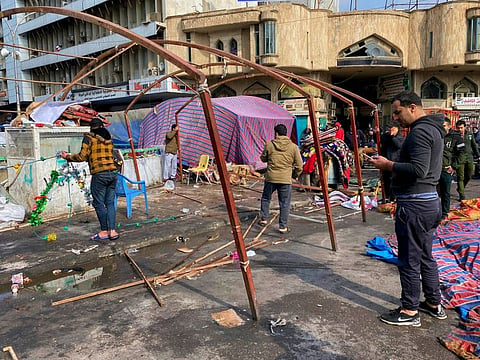Iraq protest tents set ablaze after cleric withdraws support
Al Sadr’s followers and his militia group had shielded protesters from troops

Baghdad: Security forces set fire to anti-government protest tents in the country’s south early Saturday and re-opened key public squares in Baghdad that had been occupied by demonstrators for months.
The crackdown came hours after a powerful Shiite cleric dealt the protest movement a blow by withdrawing his support, prompting his followers to pack up and leave the demonstration encampments.
At least eight people were wounded when security forces fired tear gas in Baghdad’s central Khilani Square as clearance operations were underway, medical and security officials said. The officials spoke on condition of anonymity in line with regulations.
Activists said the presence of Muqtada Al Sadr’s followers and his militia group had shielded the protesters from security forces and unknown groups looking to harm and suppress them. With that cover gone, many in the four-month-old movement feared the worst.
The demonstrations have been critical of government corruption, high unemployment and Iranian influence in Iraqi politics. Crackdowns by security forces have killed at least 500 protesters. But many of the protesters are worried that the conflict between the US and Iran, which is playing out in part on Iraqi soil, is killing their momentum.
In a tweet Friday evening, Al Sadr indicated his “disappointment” towards anti-government protesters in Baghdad’s Tahrir Square, the epicenter of the anti-government protests. Al Sadr’s tweet came just hours after tens of thousands of his followers staged a separate anti-US rally in a nearby Baghdad neighbourhood, which most demonstrators in the square steered clear of.
“I am expressing my disappointment and my regret toward all those who doubted me among the Tahrir Square protesters,” said the tweet. “I thought they were supporters of me and of Iraq.” He also accused protesters of being “foreign paid tools.”
At around 2am local time Saturday, riot police set had fire to a protest encampment in a central square in the oil-rich southern city of Basra, two activists said. The crackdown came after Al Sadr’s followers had packed up their tents and left.
“The protest square is now controlled (by the security forces), after they used force,” said Basra activist Nakeeb Lueibi, “This is considered a betrayal by the Al Sadr bloc. Our demonstrations are for the good of our country. There will be no peace after what has happened in Basra last night.”
In Baghdad, key squares and roads that had previously been a focal point of protest violence were re-opened for vehicle access, according to a statement from the Baghdad Operations Command.
Protesters said they were fearful that security forces would next come to root them out of Tahrir Square. At least eight tents occupied by Al Sadr’s supporters were removed, said one activist.
“(Al Sadr’s statement) gave the green light for the government to suppress the demonstrations,” said Husanien Ali, a 35-year-old protester. “We consider this a betrayal of the blood of the martyrs and the sacrifices made by the followers of Muqtada Al Sadr.”
In Baghdad, the vital Mohammad Al Qasim highway, Tayaran Square and Al Nidhal Street were all reopened.
Ahrar Bridge, which had been partly occupied by protesters in a stand-off with security forces, was also reopened, according to Baghdad Operations Command. Concrete blocs were removed to re-open Al Khilani Square, the statement said.
Concrete blocs were removed from the street and cleaning crews were sweeping Ahrar Bridge, one activist said.
Protesters continued to occupy Jumhuriya and Sinak bridges, which lead to the heavily fortified Green Zone.



